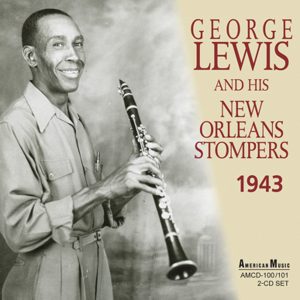True fans of clarinetist George Lewis and New Orleans traditional jazz should rejoice at the release of this two-CD, 25-cut product that stands as the legendary clarinetist’s first recording. Perhaps even more important is that the music was captured and preserved and is now available as a part of the George H. Buck Foundation catalog. Recorded by the renowned historian Bill Russell whose letters to his brother Homer from before and during the sessions act as the package’s liner notes. They add a wonderful sense of time and space and a look into the attitudes of the era.
The first five selections on disc one were caught by Russell as the band rehearsed at drummer Edgar Mosley’s home. Lewis and his New Orleans Stompers strike up with a lively version of “Climax Rag.” The group includes Lewis, Mosley, banjoist Lawrence Marrero, tuba man Sidney “Jim Little” Brown and trombonist Jim Robinson. Interestingly, and perhaps a bit confusing to the non-initiated, Russell calls Robinson by his nickname, Jim Crow, in the liners. One thing is for sure: Robinson plays a very prominent part on this cut and throughout the “trumpet-less” rehearsals. He was a big man with a big sound.
Lewis is naturally at the center and his beautiful tone and incredible range enhance every song, as illustrated on the stunning rendition of Buddy Bolden’s “Don’t Go ‘Way Nobody.”
The day after, Sunday, May 16, 1943, Russell, Lewis and the Stompers headed to the Gypsy Tea Room #1 on the corner of St. Ann and N. Villere Streets in the Treme. For the official recording, trumpeter Avery “Kid” Howard and upright bass man Chester Zardis, replacing Brown’s tuba for the low end, joined the crew. That’s the lineup for the next 20 cuts, many of which, it should be noted, are repeated. To genuine aficionados of classic New Orleans jazz and Lewis’ adorers, it must be joyous to be able to experience as much of this recorded music as possible. To the average listener, hearing songs more than once is educational and really quite enjoyable.
The album ends on a lovely version of “Whenever You’re Lonesome, Telephone Me.” Its melancholy mood “sings” a sweet goodbye.





